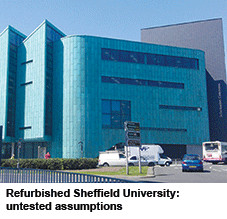 Huge investment in university estates and impressive infrastructure doesn’t necessarily result in an improved learning experience for students, according to a new study. Researchers at the University of Manchester and Kingston University have found that staff and students are often uncertain about how to maximise the educational potential of newly built flexible teaching spaces and the technology installed in them.
Huge investment in university estates and impressive infrastructure doesn’t necessarily result in an improved learning experience for students, according to a new study. Researchers at the University of Manchester and Kingston University have found that staff and students are often uncertain about how to maximise the educational potential of newly built flexible teaching spaces and the technology installed in them.
When they surveyed 212 second-year undergraduates at a Russell Group institution to find out what they felt would most enhance their learning experience, less than 5 percent said that better designed buildings are a priority. The study, published in the Journal of Higher Education Policy and Management, acknowledges that investment in new buildings may have proved to be a useful marketing tool for UK universities, which collectively spent more than £2.5 billion (Rs.24,085 crore) on their estates in 2014-15.
But authors Steven Jones, Michael Sutcliffe, Joanna Bragg and Diane Harris say that universities cannot afford to “sit back, confident that their lavish capital expenditure programmes are delivering the best possible experience”. “The sums being spent by universities on new buildings are eye-watering, but the jury is still out on how much difference they really make to students’ learning,” says Dr. Jones, a senior lecturer at the Manchester Institute of Education. “The danger is that once the ribbon is cut at the grand opening event, staff and students are left to figure out for themselves how the new spaces can be used to best pedagogical effect.”
In a series of interviews, lecturers noted that flexible learning spaces rely heavily on the assumption that students are autonomous learners, and this isn’t always the case. “It takes a kind of maturity and independence that we’re not currently expecting in undergraduates,” said one interviewee. Many students commented that university estates are visually impressive and that they appreciate collaborative learning spaces, but they don’t quite understand what should be going on in these areas.
Technology also emerged as a concern, with academics repeatedly expressing fear about lacking the skills, or technical support to fully utilise new technology in learning spaces. Students experience similar problems, with several describing using their phones or laptops to record lecture slides because of difficulties of accessing them online.
“The research suggests that lots of assumptions may be being made about how university buildings are interacted with, and that these assumptions need to be tested more robustly,” says Jones.























